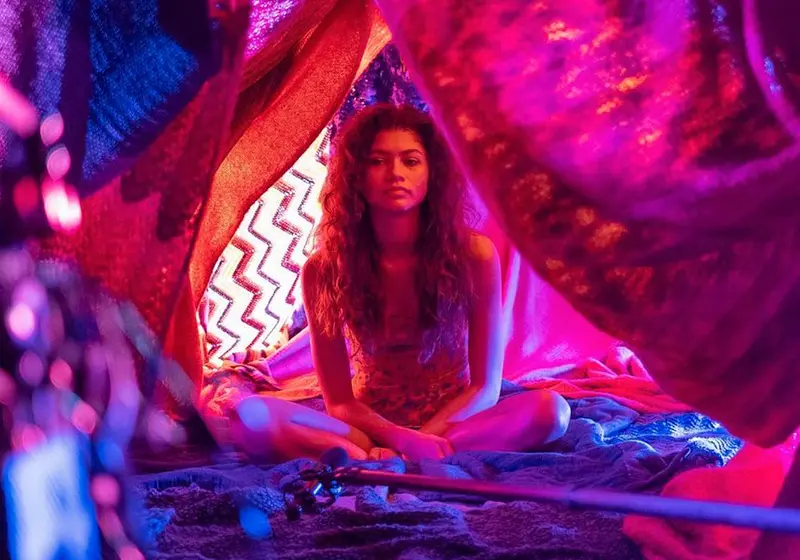At 9 p.m. on Sunday night, my friends and I all squish together on the couch of one of our suites and go silent as the newest episode of Euphoria airs on HBOMax. Of course, we don’t stay that way for long; whether it be cringing at Cassie prancing down the stairs in front of Nate (“she’s down bad– in the trenches,” one of my friends remarks) or clinging to each other as Rue creeps out of Laurie’s apartment, our screening of Euphoria is full of commentary.
And as the credits roll and we turn down the volume, we can always rely on Rue’s narration, Maddy’s arguments, or Labrynth’s musical scores to drift into our ears from suites above, below, and next to us.
Of course, Euphoria, an HBO series written by Sam Levinson and starring Zendaya as a (semi) recovering drug addict as she navigates a complicated high school life, isn’t only popular amongst the students of my college dorm. The teen drama television series has been a resounding success since its premiere in 2019, with the season one premiere drawing in the highest premiere audience numbers for an HBO NOW regular series since Westworld, and season two shattering these numbers to set a new record.
But as we watch shows like Euphoria that sweep the nation and take over social media in a storm, and later engage in discussions about them, we have to ask ourselves: what’s being encouraged or challenged, and what kinds of effects do the shows have? What kinds of messages and implications does Euphoria have?
Zendaya stars in Euphoria (Eddy Chen, HBO)
They aren’t simple questions, and they don’t have clear-cut, objective answers– or at least, if they do, I don’t yet know them. With its ethereal cinematography, eclectic mix of music featuring a dynamic musical score by Labrynth, and sometimes-hilarious-and-also-profoundly-moving performances from the cast, it’s easy to become entranced by the dark, violent glitz and glam of Euphoria.
The series has been at the center of a lot of both excitement and criticism for a number of reasons, but the most common topic of controversy (besides Maddy vs. Cassie, which, really, has a clear answer) is Euphoria’s approach to trauma, drug use, and dangerous actions.
“Drugs are kind of cool. I mean, they're cool before they wreck your skin. And your life.
And your family,” Rue explains to the audience. Here, her casual, slightly deadpan voice belies how what she’s just said touches on a core theme of the show: that actions have consequences. The characters of Euphoria are all deeply flawed in different ways, all addicted to self-destructive behaviors that endanger them emotionally and physically.
Stunning visuals render Euphoria a work of cinematic art (HBO)
Euphoria is a cinematic masterpiece, with Marcell Rév piecing together harsh yet soft lighting, dynamic camera movements, and vibrant colors to create a show swirling with mesmerizing artistry. Yet, these stunning visuals have larger implications beyond being eye candy, argues renowned youth poet Samuel Getachew. “My criticism lies in the way it aestheticizes the traumas it depicts, an aestheticization that my generation is particularly vulnerable to,” he writes, pointing to how most characters “repeatedly endanger themselves and others and yet miraculously continue to avoid major catastrophe or even parental intervention.” And Getachew isn't wrong: Nate attacks and blackmails a man to take the fall for choking Maddy, and Kat illegally forays into the world of sex work, to name just a couple of the many questionable actions of the teens in Euphoria.
The only character we see face some real form of consequences is Rue, who sits in half-paralyzed fear as she’s force-fed fentanyl by Fez’s shady drug dealer associate Mouse, and whose family dynamic teeters precariously on her sobriety.
This is a dangerous trend in Euphoria’s first season. Despite cautions placed at the beginning of episodes and posts by Zendaya warning viewers of mature content (both of which are good measures to take, don’t get me wrong), Euphoria fails to “fully disclaim its risks and hazards,” instead functioning to romanticize and validate teen irresponsibility and self-destructive, dangerous behaviors.
Enamored by the flashy outfits and glittery makeup that are never out of place, it’s easy to find ourselves leaning in, hoping for an immersion that surpasses what we can achieve by merely watching the show.
“With the second season comes an opportunity for the show to redeem itself… or to double down on its faults,” concludes Getachew. Now only one episode away from the season’s close, it seems like the carefully constructed world that has tied all of the characters’ actions up neatly is collapsing– and no one is going unscathed.
Darker colors and more minimalist makeup saturate the second season of Euphoria (HBO)
From the very first episode, it is clear that this season will be different. The color scheme is darker, flooded with cooler tones, and the makeup is less elegantly glamorous. And as the season unravels, the characters begin to suffer the consequences of their actions in dire, catastrophic ways that leave me and my friends crying, throwing chips at the screen, and gripping each other in anticipation.
There are, of course, close calls that the characters skate by. Cal twists and turns the car with drunken erraticness as he dances with death on the road. Cassie is frozen in terror as she narrowly escapes being discovered by Maddy after hooking up with Nate in the bathroom. Jules and Elliot dodge and weave as they steal White Claws from a liquor store in a rather pathetic shoplifting decision.
But, as the second season of Euphoria begins to prove, actions have consequences, and at some point, the tension will find its outlet. Cassie and Nate’s illicit relationship is revealed by Rue, and it shatters Cassie and Maddy’s friendship. Cassie leaps into obsession with Nate, subjecting herself to brutal rituals and docile submission as she tries desperately to become the embodiment of all of Nate’s fantasies.
She borders on mental breakdowns, and her decision to throw away her connections to her family and friends takes its toll on her as she desperately schools her face into a smile in an effort to convince everyone— including herself— that her facade of happiness is real. And, Maddy’s love for Nate keeps her connected to him in ways that continue to torment her and trap her within a toxic cycle that leaves her sobbing on her bed.
“When did Euphoria become a horror film?” my friend whispers to me while we screen it, because all of a sudden there is genuine fear for Rue’s safety. With her luggage of opiates flushed down the toilet, along with her dreams of being a mastermind female drug lord, Rue spirals.
She lets loose a fierce, verbally and physically violent tirade directed towards her mother, Gia, Jules, and Elliot, smashing and screaming and whispering and throwing. She causes car crashes, barely avoiding being hit herself, clutches her side and dry heaves as she suffers from withdrawal, and escapes from Laurie’s apartment and whatever fate she would have faced had she stayed there.
Rue spirals after being confronted by Jules, Elliot, and her mother (HBO)
Rue herself is clearly in pain– emotionally, mentally, and physically. But equally as important is that we are shown how her actions impact those around her. Gia and their mother cling together and cry as they plead for Rue to stop, Jules’ voice trembles as she insists that Rue doesn’t mean what she’s saying, and chaos erupts at the Howard house when Rue exposes Cassie’s secret. Her self-destructive patterns have finally reached a breaking point, and everyone is left reeling.
Rue’s created a rift in her family, one that she finally finds herself wanting to truly mend. Gia and her mother agonize over Rue’s sobriety, with Ali aptly noting that in the wake of Rue’s addiction, Gia has been left to suffer in silence and become hyper-independent. And, in a profoundly grounding scene, we see Rue, snot dripping down her nose, shaking violently as she fails to even unwrap a Jolly Rancher.
The second season, it is clear, is a game changer. It shows us, in stark contrast to the first season, real consequences. Consequences of Rue’s lack of sobriety on her safety, mental stability, and interpersonal relationships.
Consequences of Cal and Nate’s secrets on their family. Consequences of the deadly, euphoric addictions that the characters all cling to in one way or another.
Is Euphoria transmitting and encouraging harmful messages? Or is it breaking down stigma and opening the floor for important discussions? Certainly, the show has many negative and positive implications that extend past what’s discussed here.
But the importance lies in not banging the gavel and sentencing Euphoria to life in prison or clearing it of all charges. Will my friends and I, along with thousands of people, continue to watch Euphoria? Yes, and that’s okay.
But we have to be conscious of the kinds of messages that are being transmitted, whether on purpose or not, and be willing to voice our concerns and critiques. Understanding and discussing controversial, problematic, and applauded aspects of TV shows is valuable, and critical to positive forms of active viewership.







.jpg)
.jpg)



